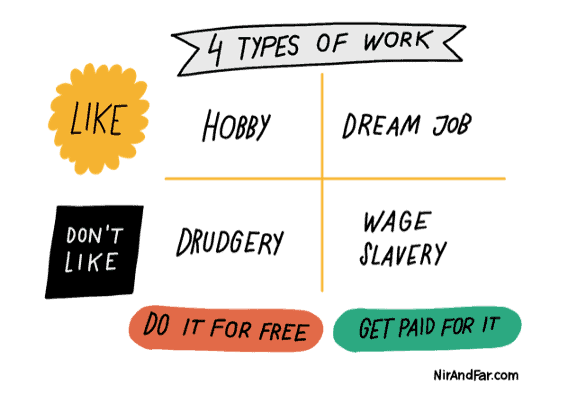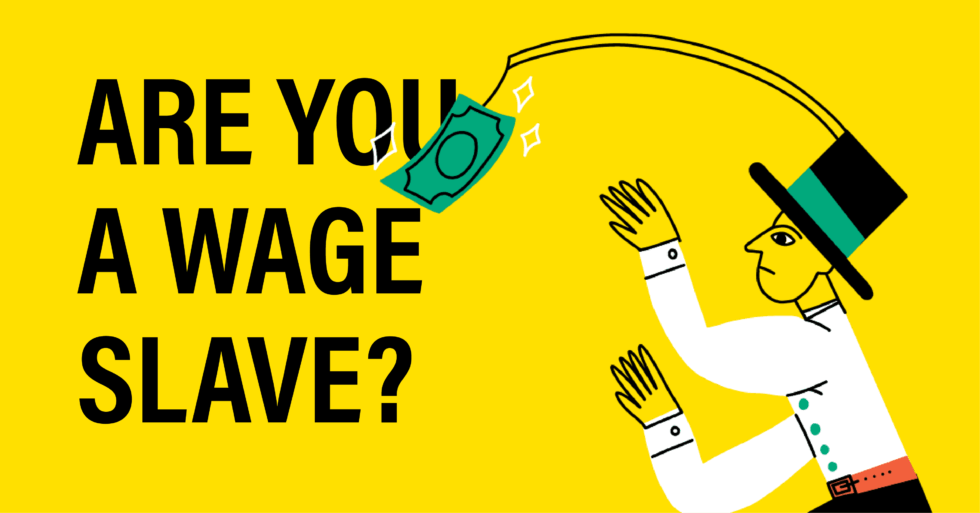In 100 years, some things we consider normal today will make people say, “Wow, how barbaric—I can’t believe people did that! How were they okay with that?”
Wage slavery, I hope, will be one of those things.
Being a wage slave means you are stuck doing a job solely for the money. You can’t quit, because leaving would have terrible consequences for you and your family. For example, in America, leaving your job not only means a loss of income but can also mean losing your healthcare coverage as well.
This seems inhumane. For many wage slaves, leaving a job puts them one broken arm away from bankruptcy, so they stay put, whether they like it or not.
During the pandemic, many workers, like meat-packers, have little choice but to put themselves at increased risk of catching the virus while on the job. Tens of millions of Americans (and likely billions worldwide) are trapped doing jobs they hate but can’t leave.
It’s helpful to think about work in terms of four categories:

If you’re getting paid to do something you like doing, that’s great! You have a dream job.
If you’re doing something you like for free, that’s good, too; you have a hobby.
If you’re doing something you don’t like for free, it’s drudgery; that’s just part of life. It’s not necessarily enjoyable, but we have to fold the laundry and do the dishes.
But in the final quadrant, if you’re getting paid to do something you don’t like but are stuck doing, you’re a wage slave, and it sucks.
Every job involves doing some tasks we don’t enjoy. A job doesn’t have to be perfect all the time to be a good job. As long as there are reasons other than “my family may become homeless” that keep you coming back, it’s not wage slavery. Enjoying the camaraderie with colleagues, riding the goods and bads, or enjoying other perks can make a job honorable and worthwhile.
We may also agree to temporarily take on jobs we dislike on our way to the next rung up the ladder. After high school, I was a busboy at a tortilla joint on nights and weekends to make extra cash. It was a miserable job that I did just for the money, but I quickly looked for something with less dishwashing and margarita lime-cutting as soon as I had something to show on my resume. But working a less-than-ideal job for a while is different from being trapped in one.
To avoid long-term wage slavery, workers who want to leave their jobs need to have options. They need to have an alternative to their current situation that doesn’t involve going hungry (or going without basic necessities). Here are a few routes I can see, based on current trends:
Promote full employment
This is the classic, free-market approach to providing flexibility and freedom to workers. By growing the economy, we can create jobs and bring unemployment down. Then, when the economy is near “full employment” (categorized by unemployment around four percent), companies begin competing for workers by offering higher wages and better benefits. It is during periods of full employment that wages of lower-income earners tend to rise and quitting a crappy job becomes less risky as people have more options.
This is great when it works. But when things break down and unemployment goes up, the job market becomes less hospitable to employees seeking to escape wage slavery. People once again get stuck in jobs they hate because leaving isn’t an option. What then?
Lower the cost of living through innovation
Through technological advances, we can make subsistence cheaper. For example, automation in manufacturing has made it less expensive to produce food and clothing. In the year 1900, Americans spent 57% of their income on food and clothing. By 2003, it was only 17%.
My grandparents mended their socks; today, almost everyone buys new ones instead. Food has become incredibly cheap—it’s possible to eat healthfully for less than $10 per day.
The drop in prices of some of the necessities of life should mean we have more flexibility to job hop without starving. But even with these improvements, automation hasn’t made a dent in the cost of healthcare, education, or housing. That’s where other technological and cultural trends have a part to play.
Do more via the Internet
Working from home is becoming mainstream and more jobs can be done from anywhere. The pandemic has accelerated this trend, and that might be a great thing for workers.
If you can do your job virtually, you have two major advantages that can help you avoid wage slavery. First, you can choose to live somewhere with a low cost of living, so you’re less dependent on a higher paycheck and can save more. Many people have already figured this out, choosing to live more cheaply in the heartland while working for companies based on the coast.
Furthermore, the internet is helping people turn their hobbies into dream jobs. Thanks to online platforms, it’s easier to monetize skills like graphic design, video editing, and other things people typically learn and do for fun. For instance, when a fan recently created a beautiful Instagram post using a quote from one of my books, I offered to hire her to make more for my account. Creating inspirational posts was something she did just for fun for herself, but now she can make money on her hobby in her spare time.
A better safety net
Can we imagine a future where people don’t have to work? Especially if automation significantly lowers the cost of living, it might be possible to introduce a universal basic income (UBI), so everyone can live, even without working. Maybe this would even incentivize employers to do better by their employees since they know their workers are free to leave anytime.
Of course, there are lots of questions about UBI and similar programs. That’s why we need more research on how people respond to new incentives. One study conducted in Kenya suggests that direct cash transfers, in certain situations, can bring people out of poverty not only in the short term, but in the long run. I’d like to see more exploration in this vein but it’s clear some form of a capitalist welfare state will be the best path forward.
These solutions aren’t perfect—but neither is the status quo
Throughout history, people have often been subjected to working in horrible conditions to eke out a living. Thankfully, more people are being lifted out of abject poverty faster than at any other time in history. This means fewer people are forced to live hand to mouth. But wage slavery isn’t only about how much people make; it’s about the freedom to walk away to choose a better option.
As a society, we owe it to ourselves to pursue freedom from wage slavery. A century from now, I hope we’ll look back and wonder how we ever accepted otherwise.
Related Articles
- Schedule Maker: a Google Sheet to Plan Your Week
- Habit Tracker Template in Google Sheets
- The Ultimate Core Values List: Your Guide to Personal Growth
- Timeboxing: Why It Works and How to Get Started in 2024
- An Illustrated Guide to the 4 Types of Liars
- Hyperbolic Discounting: Why You Make Terrible Life Choices
- Happiness Hack: This One Ritual Made Me Much Happier

